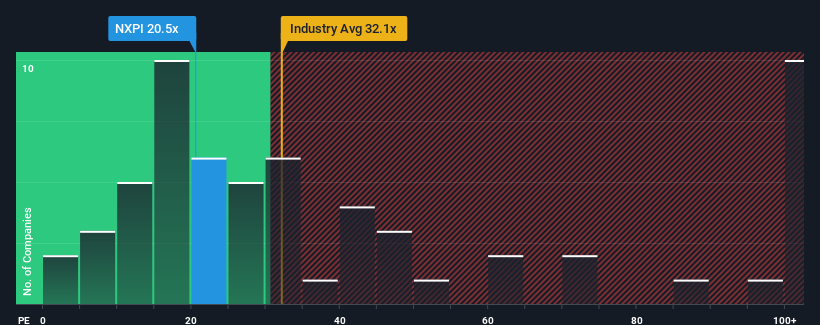- United States
- /
- Semiconductors
- /
- NasdaqGS:NXPI
NXP Semiconductors N.V.'s (NASDAQ:NXPI) Shares Not Telling The Full Story
There wouldn't be many who think NXP Semiconductors N.V.'s (NASDAQ:NXPI) price-to-earnings (or "P/E") ratio of 20.5x is worth a mention when the median P/E in the United States is similar at about 19x. However, investors might be overlooking a clear opportunity or potential setback if there is no rational basis for the P/E.
NXP Semiconductors hasn't been tracking well recently as its declining earnings compare poorly to other companies, which have seen some growth on average. One possibility is that the P/E is moderate because investors think this poor earnings performance will turn around. If not, then existing shareholders may be a little nervous about the viability of the share price.
See our latest analysis for NXP Semiconductors

Does Growth Match The P/E?
There's an inherent assumption that a company should be matching the market for P/E ratios like NXP Semiconductors' to be considered reasonable.
If we review the last year of earnings, dishearteningly the company's profits fell to the tune of 2.7%. Even so, admirably EPS has lifted 86% in aggregate from three years ago, notwithstanding the last 12 months. Accordingly, while they would have preferred to keep the run going, shareholders would probably welcome the medium-term rates of earnings growth.
Looking ahead now, EPS is anticipated to climb by 13% per year during the coming three years according to the analysts following the company. Meanwhile, the rest of the market is forecast to only expand by 11% each year, which is noticeably less attractive.
With this information, we find it interesting that NXP Semiconductors is trading at a fairly similar P/E to the market. Apparently some shareholders are skeptical of the forecasts and have been accepting lower selling prices.
What We Can Learn From NXP Semiconductors' P/E?
Generally, our preference is to limit the use of the price-to-earnings ratio to establishing what the market thinks about the overall health of a company.
Our examination of NXP Semiconductors' analyst forecasts revealed that its superior earnings outlook isn't contributing to its P/E as much as we would have predicted. When we see a strong earnings outlook with faster-than-market growth, we assume potential risks are what might be placing pressure on the P/E ratio. It appears some are indeed anticipating earnings instability, because these conditions should normally provide a boost to the share price.
Before you take the next step, you should know about the 1 warning sign for NXP Semiconductors that we have uncovered.
Of course, you might find a fantastic investment by looking at a few good candidates. So take a peek at this free list of companies with a strong growth track record, trading on a low P/E.
Valuation is complex, but we're here to simplify it.
Discover if NXP Semiconductors might be undervalued or overvalued with our detailed analysis, featuring fair value estimates, potential risks, dividends, insider trades, and its financial condition.
Access Free AnalysisHave feedback on this article? Concerned about the content? Get in touch with us directly. Alternatively, email editorial-team (at) simplywallst.com.
This article by Simply Wall St is general in nature. We provide commentary based on historical data and analyst forecasts only using an unbiased methodology and our articles are not intended to be financial advice. It does not constitute a recommendation to buy or sell any stock, and does not take account of your objectives, or your financial situation. We aim to bring you long-term focused analysis driven by fundamental data. Note that our analysis may not factor in the latest price-sensitive company announcements or qualitative material. Simply Wall St has no position in any stocks mentioned.
About NasdaqGS:NXPI
NXP Semiconductors
Provides semiconductor products in China, the United States, Germany, Japan, Singapore, South Korea, Mexico, the Netherlands, Taiwan, and internationally.
Undervalued with moderate growth potential.
Similar Companies
Market Insights
Community Narratives



